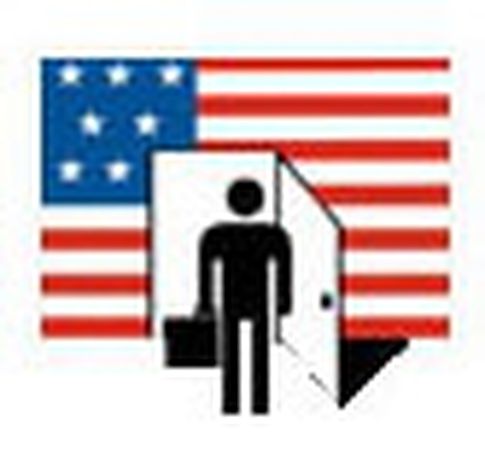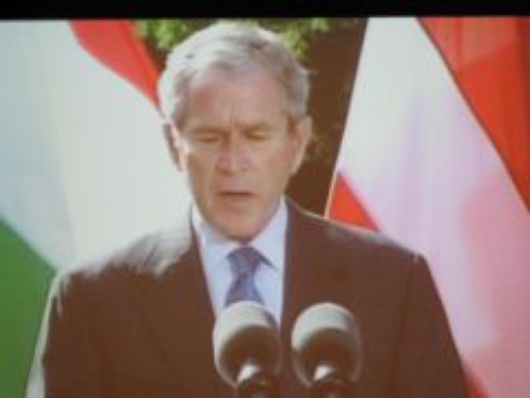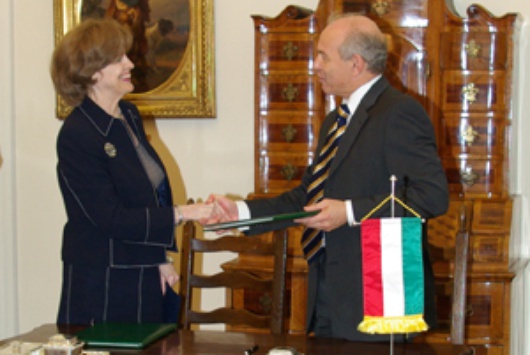
Visa free travel to the US
Published on
November 17, 2008
From November 17, citizens of Hungary and six other countries will not require a visa to travel to the US. The waiver will be valid for tourists and business travellers planning to spend less than 90 days in the United States.
However, people seeking to take advantage of the waiver must have a new type biometric passport and be registered in advance with the US Electronic System for Travel Authorization (ESTA). People holding older type passports, issued prior to August 28, 2006, may continue to use them and may enter the United States with a visa that will be valid for the duration of the passport.
On November 3, Parliament ratified for a second time the last agreement necessary for the country to join the US visa waiver program. MPs approved the modified pact with 360 affirmative votes and five abstentions. The agreement had been sent back by President László Sólyom for reconsideration on October 20. He had complained that it gave US crime-fighting authorities access to all fingerprint records in the Hungarian criminal database, including those of victims of crime. The amended Act took his objections into account.
The US Homeland Security Secretary Michael Chertoff called the lifting of the visa requirement a major milestone in a long-standing and excellent relationship between the US and Hungary.
America does not force anybody to join its visa waiver program
October 20, 2008
President of the Republic László Sólyom returned the recently adopted law on sharing criminal data to Parliament for reconsideration rather than promulgating it. This law was to be the final agreement between the United States and Hungary on the U.S. visa-waiver program.
Can the President’s decision prevent Hungary from joining the program? The answer is NO.
The President stated that although the agreement did not raise any constitutional problem in itself, it "runs the risk of allowing American access to a too extensive circle of Hungarian criminal records". Sólyom complained that the agreement authorizes keeping of a register of all fingerprints, not only those of perpetrators but including crime victims, which the US could then access due to the current Hungarian regulations. Parliament needs to resolve the Hungarian criminal registry system before readopting the law, Solyom added. EU Data Privacy Ombudsman Peter Hustinx also protested the regulation, as did the Hungarian Data Privacy Ombudsman András Jóri.
The Justice and Law Enforcement Ministry and the Foreign Ministry expressed regret at the president’s decision but stated they will study his remarks and will put forward a proposal to that effect. The American party was also disappointed by the President’s decision and expressed its strong hope that the bill will be signed by the time of the visit of US Homeland Security Secretary Michael Chertoff scheduled to October 28. The original purpose of the Secretary’s visit is to announce the date for visa exemption which can be still modified in necessary.
The bill will go before Parliament in November at the latest and MPs will again debate it before the final vote. According to the Hungarian Constitution, the President will be obliged to sign the law and announce it within five days after MPs approve it for the second time.
And the winners are…
 October 17, 17:40 (Budapest time)
October 17, 17:40 (Budapest time)
President George W. Bush announced in the White House Rose Garden that seven nations are joining the U.S. Visa Waiver Program, including six European nations and South Korea. Hungary, the Czech Republic, Slovakia, Estonia, Latvia, Lithuania will be finally added to the U.S. Visa Waiver Program on November 13.
"All of the nations represented here today allow American citizens to travel to their countries visa-free," Bush said. "For years the leaders of these nations have explained to me how frustrating it is for their citizens to wait in lines and pay visa fees to take a vacation or make a business trip or visit their families here in the United States. These close friends of America told me that it was unfair that their people had to jump through bureaucratic hoops that other allies can walk around. I told them I agree with them."
 The program allows the citizens of the newly welcomed countries to travel to the United States for stays up to 90 days without first obtaining a visa.
The program allows the citizens of the newly welcomed countries to travel to the United States for stays up to 90 days without first obtaining a visa.
While the Ambassador of the United States to Hungary and the Hungarian Minister of Foreign Affairs are congratulating to each other for the mutual success, Bulgaria, Cyprus, Greece, Malta, Poland and Romania are still on the waiting list to join the visa waiver program.
Click here to read the transcript of the president's remarks
Hungary is likely to join the US visa waiver program in January
October 8, 2008
It seems that soon we will no longer see long lines of people at the gate of the U.S. Embassy in Budapest, Szabadsag ter waiting patiently every day, regardless of the weather, to enter the Consular Section. Hungarian travelers, like every recent Hungarian administration, have for a long time complained about the strict visa requirements of the American authorities. Similarly to other countries of the Central European region, no bilateral meeting between American and Hungarian high level officials was considered complete without a mention of the firm Hungarian request to eliminate the current regulations, a stated desire since the regime change.
The long struggle is over. Hungary has now complied with all requirements for inclusion in the U.S. visa waiver program. The only condition left before Hungarians may travel to the U.S. without a visa is primarily technical and its completion depends solely on the Americans.
 On October 1, the U.S. Ambassador to Hungary April H. Foley and Hungarian Justice and Law Enforcement Minister Tibor Draskovics signed the last agreement needed for the U.S.-visa-waiver program, an accord on the exchange of criminal data. The agreement specifies an exchange of criminal-registry data, including the sharing of fingerprint and DNA information. Originally the U.S. had wanted to obtain further details, such as sexual orientation and trade union membership, but the present accord does not include such data in order to remain in harmony with the Hungarian Data Protection Law.
On October 1, the U.S. Ambassador to Hungary April H. Foley and Hungarian Justice and Law Enforcement Minister Tibor Draskovics signed the last agreement needed for the U.S.-visa-waiver program, an accord on the exchange of criminal data. The agreement specifies an exchange of criminal-registry data, including the sharing of fingerprint and DNA information. Originally the U.S. had wanted to obtain further details, such as sexual orientation and trade union membership, but the present accord does not include such data in order to remain in harmony with the Hungarian Data Protection Law.
On October 7, the U.S. Embassy in Budapest announced that the ratio of rejected visa applications was 8 percent this past fiscal year. This means that Hungary has met the final requirement for joining the U.S. visa waiver scheme by having the proportion of the rejected visa applications below the required maximum of 10 percent.
Now, the only condition left is primarily technical. The U.S. has to launch its new passenger registry system. This is an electronic system for travel authorization (ESTA) in which travelers to the United States must register themselves prior to their trip. The U.S. Embassy suggested that the ESTA could be introduced in mid-January.
Foley stated that Hungary will probably join the program before the final day of the Bush administration on January 20, 2009. This means that Hungarian tourists and business travelers may stay in the U.S. for up to 90 days without a visa. Job-seekers and students, however, will continue to need visas.
U.S. - Hungary has signed a memorandum on visa waivers
March 17, 2008
A memorandum of understanding (MOU) was signed in Washington on March 17 paving the way to the introduction of visa waivers for Hungarians from early next year.
The MOU, similar to what the Check Republic has signed recently, is part of a series of agreements to be submitted to the U.S. Congress for approval. The two governments are expected to hold talks in Budapest in the next few weeks on allowing US air marshals on US-bound flights, on cooperation against organized crime and terrorism, and on stolen and lost passports.
Visa exemption will apply only those traveling to the U.S. as tourists or for business purposes. Entry visas for Hungarian visitors will be replaced by an electronic form, similar to the ones passengers are asked to fill on the plane on their way to the US.
“We must reach further agreements regarding practical implementation, and the Americans must have the necessary technical conditions in place,” Ambassador of Hungary to the U.S. Ferenc Somogyi said, explaining that the US wants to electronically register those leaving Hungary.
Krisztina Berta, head of the consular department at the Foreign Ministry, said it is likely that there will be no fees in the new system.
In order for Hungary to join the U.S. visa-waiver program, the percentage of rejections among Hungarians that apply for visas must fall below 10 percent. According to State Department data released last November, Hungary's visa refusal rate had exceeded the 10 percent ratio by three tenths of a percent in the twelve months from September 2006 to September 2007.
U.S. Ambassador to Hungary April H. Foley said last December that Hungary would certainly fulfil the 10 percent target in 2008.
Visa requirement not quite fulfilled
November 8, 2007
Hungary narrowly failed to reach the threshold for the removal of US visa requirements last year. In all, 10.3% of visa applications were rejected, only slightly above the maximum permitted 10%.
Some other countries in the bid for a visa waiver with the U.S. have managed to meet this requirement, among them Greece (1.6 percent), Cyprus (1.8 percent), Malta (2.7 percent), Estonia (4 percent) and the Czech Republic (6.7 percent). Poland fared much below the threshold at 25.2 percent and Romania had a 37.7 percent rejection rate during that period.
Diplomats expect Hungary can pass under the 10 percent mark by the autumn of 2008.
The European Union has demanded a visa-free regime with the U.S. for all of its member states, but the actual installment is subject to negotiations.
New U.S. law brings us closer to the Visa Waiver Programme
August 29, 2007
Hungary hails the new U.S. law, including the option of extending the Visa Waiver Program to Hungarians, as a major step forward, Hungarian Foreign Affairs Spokesman Gyorgy Odze stated. Odze commented the bill U.S. President George W Bush signed into law, which, according to the White House release, allows greater flexibility to bring some of the U.S.'s closest allies into the program.
Hungarian diplomacy has been lobbying the U.S. administration and legislation consistently and for long to promote lifting the visa requirement to bring Hungary to equal platform with other close allies of the United States in combating terrorism, the spokesman said. Regarding a timeline the spokesman said it was yet hard to say exactly how soon would Hungarians be able to travel without a visa to the United States but expressed hope for the legislation procedures to be completed within one-and-a-half or two years.
He also expressed the conviction that Hungary would soon be able to meet the requirement the law retained for granting the visa-free status, namely that the annual ratio of rejected visa applications should stay below ten percent. Last year U.S. authorities rejected 12.7 percent of Hungarian visa applications, whereas the visa-refusal ratio has constantly been dropping over the past few years.
Commenting the law, U.S. affairs professor Tamas Magyarics expected no breakthrough in scrapping the U.S. visa regime for Hungary and other EU-member central and eastern European countries over the next one-and-a-half years. He argued that legislation procedure in the U.S. administration took time and politicians were anyway focused entirely on next year's presidential and congressional elections. In his view, it would be hard for the CEE countries to find a partner for speeding up the process since they are considered relatively light-weight even as a bloc. A visa-free status, even if granted, would not necessarily facilitate entry into the United States as authorities there would even in that case employ other techniques to obtain the data they need, he said. In all, neither Hungarians nor the citizens of other EU newcomers would threat the political and economic stability of the United States. The true challenge the U.S. has to meet is the inflow of tens of millions of immigrants from Latin America and the Far East, said Magyarics.



